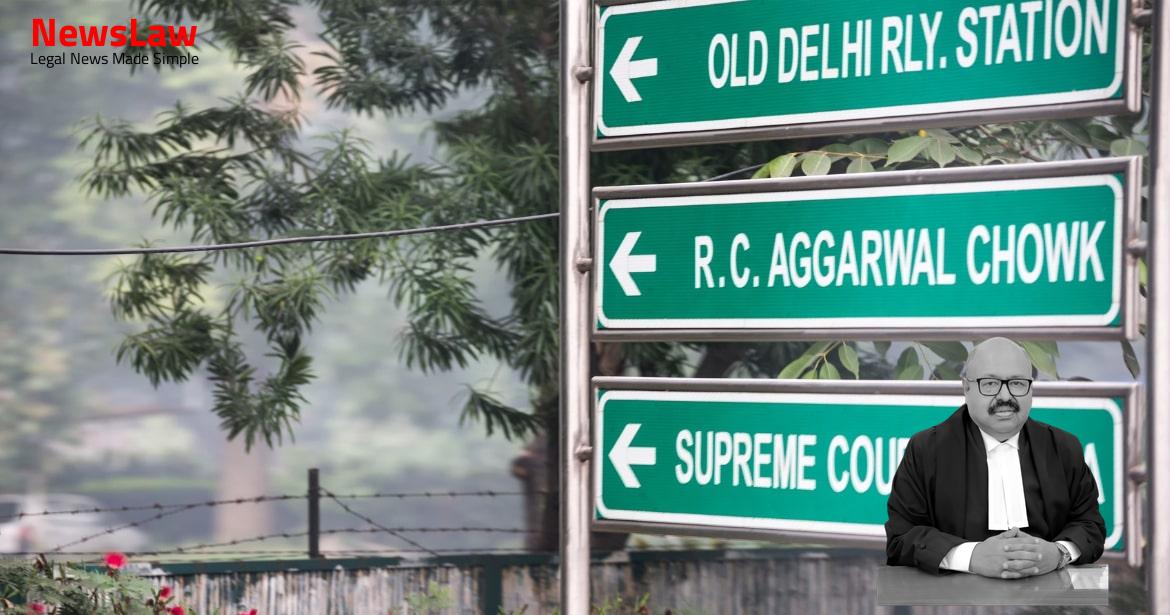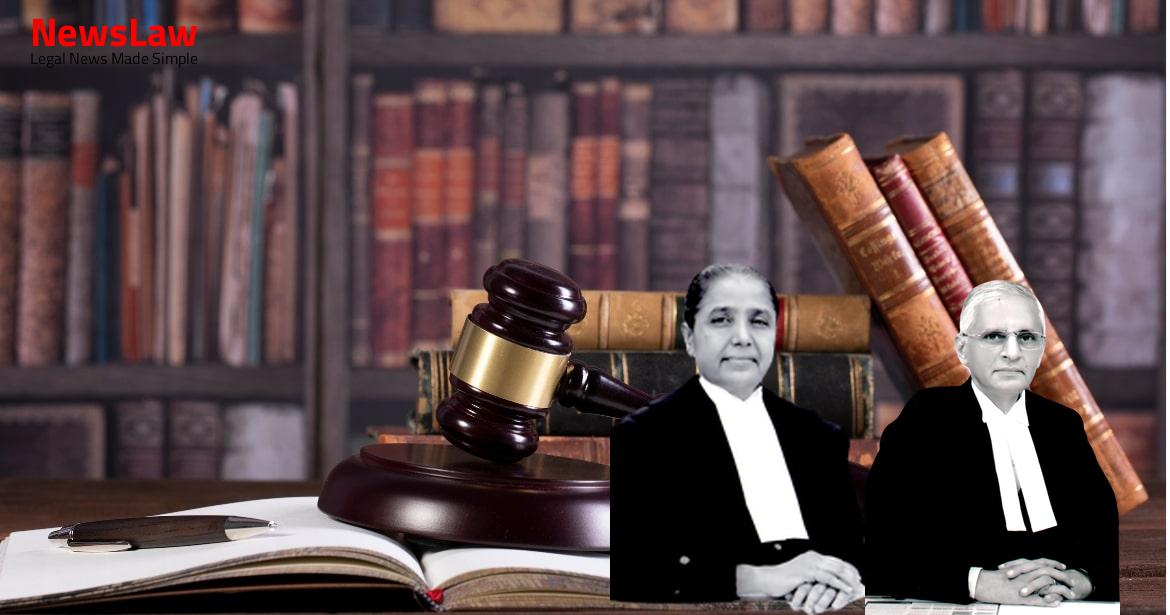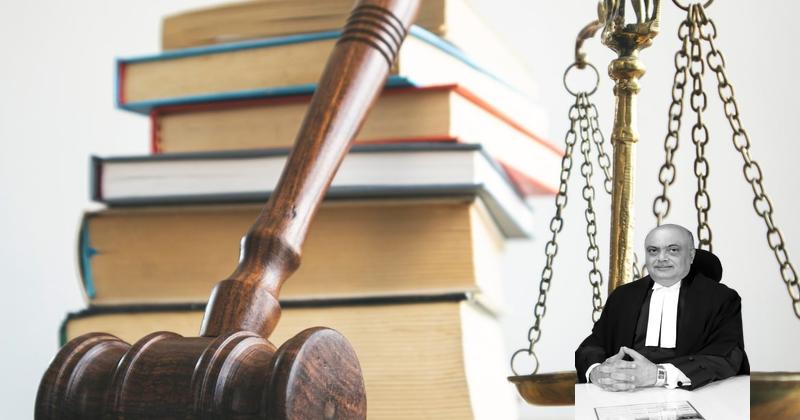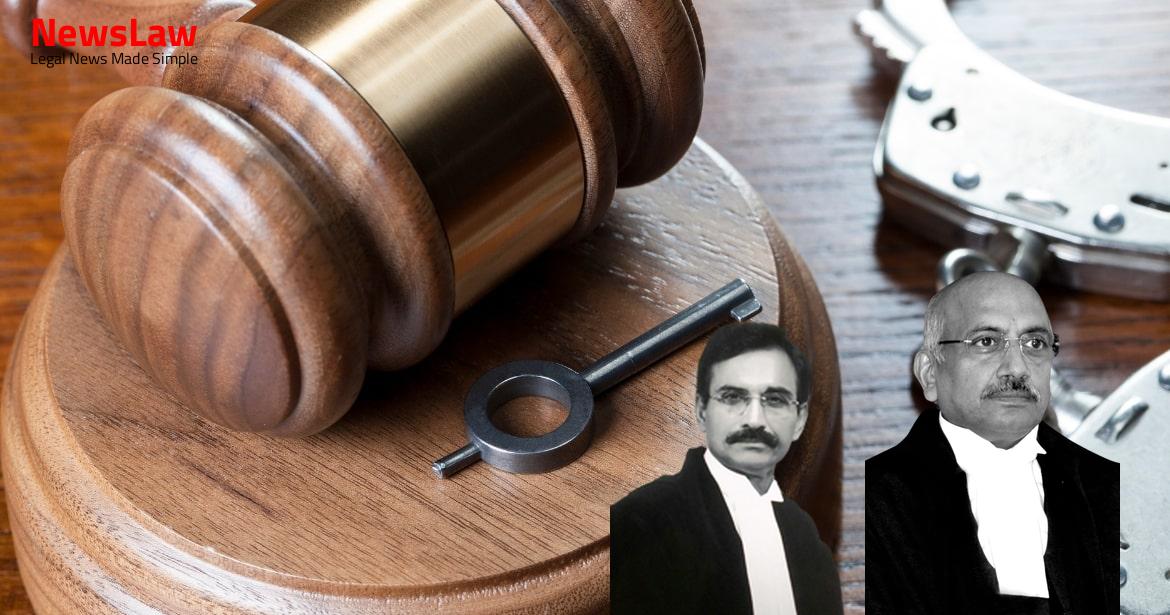Explore the complexities of legal analysis in convicting based on alleged confessional statements in a recent case. The court’s evaluation of evidence and the importance of corroborative proof in establishing guilt. Delve into the nuances of proving criminal conspiracy and the necessity for solid grounds before convicting a defendant. Stay tuned for a deep dive into the legal intricacies of the case.
Facts
- Police party escorting four accused to court was attacked by four young boys on the train.
- Accused attempted to rescue those in police custody and escape.
- Accused tried to snatch official carbine and reached Railway Station Rewari.
- Accused claimed innocence and were tried in Sessions Case No.32 of 2009.
- Prosecution examined 23 witnesses to prove guilt.
- No appeals were filed by other accused in the common judgment of the High Court.
- The appellant and four other accused filed separate appeals before the High Court challenging the judgment of conviction and sentence imposed by the Sessions Court.
- On 18.01.2010, they were sentenced to life imprisonment and fined Rs. 5,000 each for offences under Section 302 r/w Section 120-B of the Indian Penal Code.
- The Additional Sessions Judge found all accused guilty for offences under Sections 224, 225, 332, 353, 302 r/w Section 120-B of the Indian Penal Code.
- The High Court of Punjab and Haryana at Chandigarh dismissed the appeal filed by the appellant/accused on 17 March 2020, upholding the conviction and sentence passed by the Additional Sessions Judge, Rewari.
- Amarjit Singh and Surender Singh were additionally found guilty for an offence under Section 25 of the Arms Act.
- All appeals were dismissed in a common judgment on 17.03.2020, confirming the conviction and sentence imposed by the Sessions Court.
- The sentences for various offences were ordered to run concurrently.
Also Read: Challenging Legal Analysis in 1989 Scheme Eligibility Case
Arguments
- No concrete proof to establish the participation of the appellant in the alleged crime.
- No independent witness was examined.
- Alleged confessional statements of co-accused were the only evidence to connect the appellant to the crime.
- No Test Identification Parade conducted.
- Accused Vinod was apprehended, while the other three persons fled away.
- Trial Court convicted the appellant in absence of acceptable evidence.
- High Court did not consider the grounds urged and dismissed the Appeal.
- References made to relevant judgments in support of the appellant’s case.
- The respondent – State is in agreement with the Courts below regarding the guilt of the accused.
- There is credible evidence on record suggesting that the appellant was involved in a conspiracy to rescue the other accused.
- Learned Counsel relied on the judgment of the court in the case of Firozuddin Basheeruddin and Others v. State of Kerala to establish criminal conspiracy.
- Confessional statements of the co-accused were also taken into consideration, citing the judgment in the case of Raju Manjhi v. State of Bihar.
Also Read: Interpretation of Market Fee Levy under Karnataka Agricultural Produce Marketing Act
Analysis
- The word ‘confession’ has not been defined in the case, but courts have interpreted it to mean incriminating statements by the accused suggesting guilt.
- Direct acknowledgment of guilt is considered a confession, not an admission of any incriminating fact.
- Establishing conspiracy under Section 120-B requires proving an agreement for an unlawful act between parties.
- Direct evidence of conspiracy is difficult to establish; absence of evidence showing a meeting of minds between conspirators makes convicting someone under Section 120-B unsafe.
- Prosecution’s reliance on bits and pieces of evidence is inadequate to connect the accused to criminal conspiracy.
- Failure of prosecution to prove conspiracy in this case based on the lack of corroborative evidence and witness statements.
- Confessions obtained by police officers through oppression, torture, or inducement are deemed unreliable under this provision.
- Judgments from previous cases do not support the prosecution’s case in the present matter due to lack of evidence.
- Confirmation of an accused’s sentence by the High Court requires sound reasons based on material evidence.
- The High Court in this case did not thoroughly consider the evidence but rather affirmed the conviction and sentence.
- Confessions made to a police officer, even when not in an official capacity, are excluded from evidence against the accused.
- The appellant’s implication is primarily based on alleged confessional statements of co-accused with no other substantial evidence.
- The appellant was previously acquitted in a case related to snatching a car, further casting doubt on the prosecution’s case.
- A previous case, Indra Dalal v. State of Haryana, highlighted flaws in convicting solely based on confessional statements and recovery of a vehicle.
- The said case’s outcome emphasized the need for proper evaluation and consideration of evidence before convicting.
- Confessions made by a person in police custody are inadmissible unless made in the immediate presence of a Magistrate.
- Confessions made to a third person while in police custody are also considered inadmissible.
- The High Court erroneously confirmed the conviction and sentence imposed on the appellant.
- The appeal is allowed due to the above reasons.
- The conviction and sentence imposed on the Appellant cannot be maintained solely based on the alleged confessional statements of the co-accused.
- The Trial Court’s finding that the appellant was one of the conspirators for the crime is deemed erroneous and illegal.
Also Read: Legal Analysis of Arbitration Order Quashed
Decision
- The appellant is ordered to be released forthwith, unless his custody is required in connection with any other case.
- The conviction recorded and sentence imposed on the appellant are set aside.
- The appellant is acquitted of the charges levelled against him.
Case Title: PARVEEN @ SONU Vs. THE STATE OF HARYANA (2021 INSC 835)
Case Number: Crl.A. No.-001571-001571 / 2021



